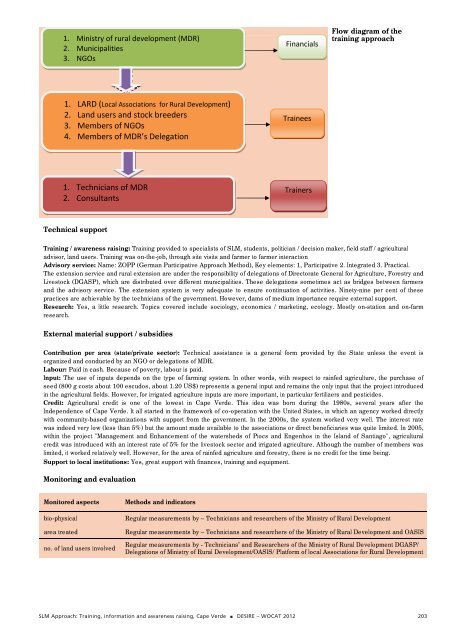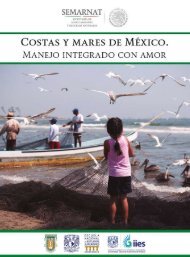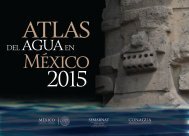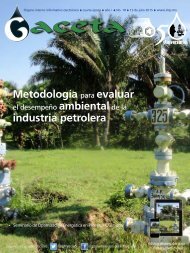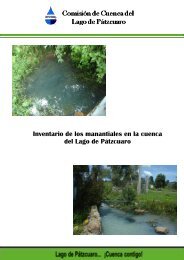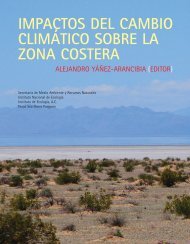Desire for Greener Land
Desire for Greener Land
Desire for Greener Land
You also want an ePaper? Increase the reach of your titles
YUMPU automatically turns print PDFs into web optimized ePapers that Google loves.
1. Ministry of rural development (MDR)<br />
2. Municipalities<br />
3. NGOs<br />
1. LARD (Local Associations <strong>for</strong> Rural Development)<br />
2. <strong>Land</strong> users and stock breeders<br />
3. Members of NGOs<br />
4. Members of MDR’s Delegation<br />
1. Technicians of MDR<br />
2. Consultants<br />
Technical support<br />
Flow diagram of the<br />
training approach<br />
Training / awareness raising: Training provided to specialists of SLM, students, politician / decision maker, field staff / agricultural<br />
advisor, land users. Training was on-the-job, through site visits and farmer to farmer interaction<br />
Advisory service: Name: ZOPP (German Participative Approach Method), Key elements: 1, Participative 2. Integrated 3. Practical.<br />
The extension service and rural extension are under the responsibility of delegations of Directorate General <strong>for</strong> Agriculture, Forestry and<br />
Livestock (DGASP), which are distributed over different municipalities. These delegations sometimes act as bridges between farmers<br />
and the advisory service. The extension system is very adequate to ensure continuation of activities. Ninety-nine per cent of these<br />
practices are achievable by the technicians of the government. However, dams of medium importance require external support.<br />
Research: Yes, a little research. Topics covered include sociology, economics / marketing, ecology. Mostly on-station and on-farm<br />
research.<br />
External material support / subsidies<br />
Contribution per area (state/private sector): Technical assistance is a general <strong>for</strong>m provided by the State unless the event is<br />
organized and conducted by an NGO or delegations of MDR.<br />
Labour: Paid in cash. Because of poverty, labour is paid.<br />
Input: The use of inputs depends on the type of farming system. In other words, with respect to rainfed agriculture, the purchase of<br />
seed (800 g costs about 100 escudos, about 1.20 US$) represents a general input and remains the only input that the project introduced<br />
in the agricultural fields. However, <strong>for</strong> irrigated agriculture inputs are more important, in particular fertilizers and pesticides.<br />
Credit: Agricultural credit is one of the lowest in Cape Verde. This idea was born during the 1980s, several years after the<br />
Independence of Cape Verde. It all started in the framework of co-operation with the United States, in which an agency worked directly<br />
with community-based organizations with support from the government. In the 2000s, the system worked very well. The interest rate<br />
was indeed very low (less than 5%) but the amount made available to the associations or direct beneficiaries was quite limited. In 2005,<br />
within the project "Management and Enhancement of the watersheds of Piocs and Engenhos in the Island of Santiago", agricultural<br />
credit was introduced with an interest rate of 5% <strong>for</strong> the livestock sector and irrigated agriculture. Although the number of members was<br />
limited, it worked relatively well. However, <strong>for</strong> the area of rainfed agriculture and <strong>for</strong>estry, there is no credit <strong>for</strong> the time being.<br />
Support to local institutions: Yes, great support with finances, training and equipment.<br />
Monitoring and evaluation<br />
Monitored aspects Methods and indicators<br />
bio-physical Regular measurements by – Technicians and researchers of the Ministry of Rural Development<br />
area treated Regular measurements by – Technicians and researchers of the Ministry of Rural Development and OASIS<br />
no. of land users involved<br />
Financials<br />
Trainees<br />
Regular measurements by - Technicians’ and Researchers of the Ministry of Rural Development DGASP/<br />
Delegations of Ministry of Rural Development/OASIS/ Plat<strong>for</strong>m of local Associations <strong>for</strong> Rural Development<br />
SLM Approach: Training, in<strong>for</strong>mation and awareness raising, Cape Verde DESIRE – WOCAT 2012<br />
Trainers<br />
203


